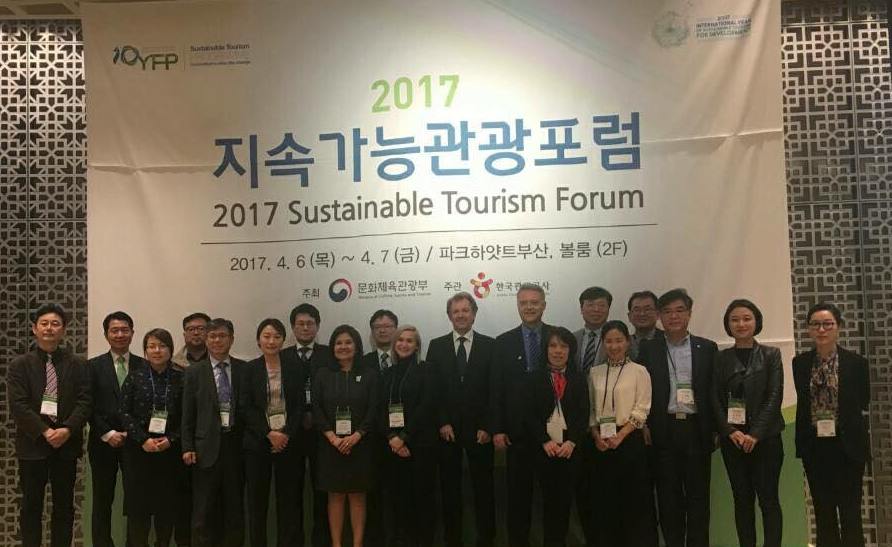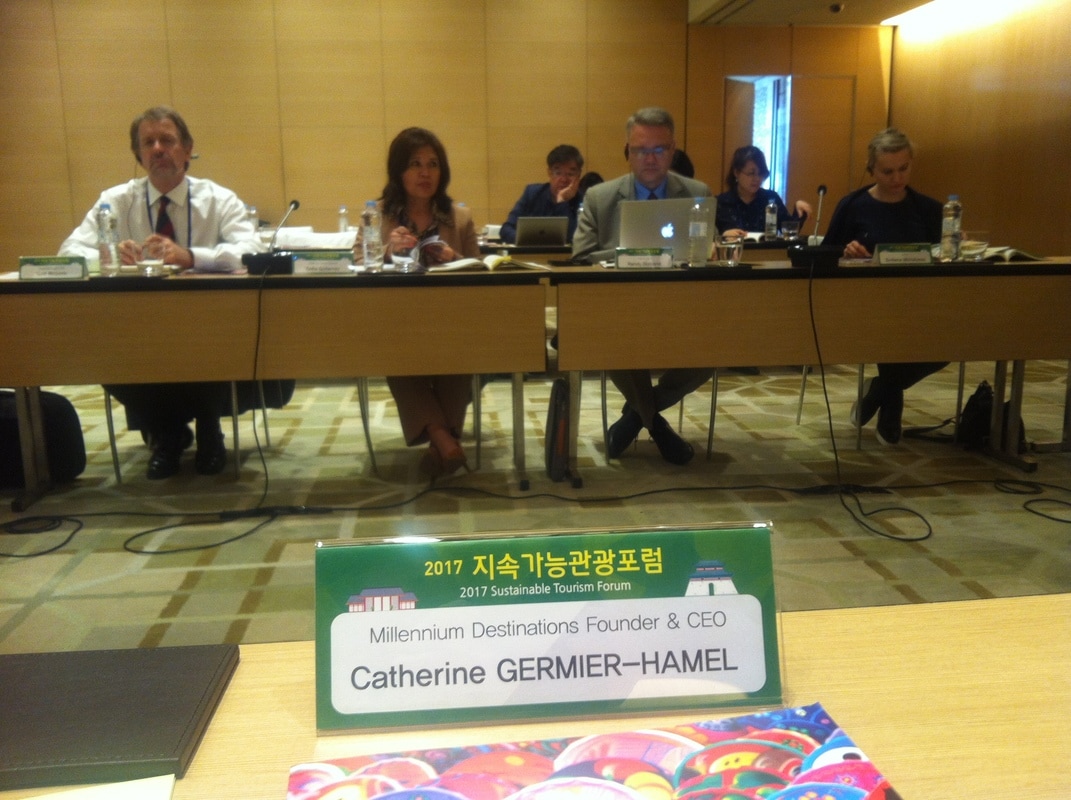|
As a continuation of the Asia-Pacific Regional Consultation on the Sustainable Tourism Programme (STP) of the 10-Year Framework of Programmes on Sustainable Consumption and Production (10YFP) which took place in April 2014 in Busan, South Korea, the Korean Ministry of Culture, Sports and Tourism (MCST) and the Korea Tourism Organization, co-hosted the 2017 Busan Sustainable Tourism Forum (BSTF) on April 6 to 8, 2017. --------------------------------------------------- Whereas 2017 has been declared International Year of Sustainable Tourism for Development (IY2017) by the United Nations, the Forum was aimed at building a consensus on the paradigm of sustainable tourism, and particularly its definition, application and dissemination, sharing ideas and insights on guidelines, standards, and good practices, and raising awareness of the 10YFP Sustainable Tourism Program (STP). Through a series of panel discussions, 2017 BSTF was also an opportunity to discuss several issues related to the advance of sustainable tourism in South Korea, and globally, such as the promotion of consumption & production patterns, certification, criteria and monitoring, energy efficiency, and strategies to engage both the industry players and the consumers. On the first day, Sofía GUTTIERREZ, UNWTO's Deputy-Director of Sustainable Development of Tourism Programme, delivered a keynote address on the 2017 International Year of Sustainable Tourism for Development, its road map, objectives and activities in the field of awareness-raising, advocacy and capacity-building to mobilize all stakeholders and foster positive changes in policies, practices and consumer behavior. Her presentation was concluded by the "Travel - Enjoy - Respect " video (see below). Randy DURBAN, CEO of the Global Sustainable Tourism Council - GSTC gave a presentation titled "How Certification Impacts Sustainable Tourism". While highlighting the growing demand for certifications both from the supply and demand sides, he also stressed that mature destinations should focus on quality, and attract tourists who stay longer, spend more money and appreciate the local culture. Svitlana MIKHALYEVA, Public Affairs Consultant at UN Environment (UNEP) moderated a discussion on the 10YFP STP as Coordination Desk Officer on behalf of the French Government (Ministry of Environment). She provided details on the various work areas and initiatives of the Programme, and insisted that sustainable tourism should be planned and implemented in a scientific and holistic way, taking into account the integrated, cross-cutting nature of tourism, with product life-cycle and value-chain approaches. Neil ROGERS, CEO of Sweden-based Rogers & Co, made a comprehensive presentation illustrating Strategies for Sustainable Community-Based Tourism. In particular, he highlighted the necessity for destinations to attract the right tourists, i.e. those who care about their impact on the host destinations and local communities. This presentation was followed by a panel discussion on "Future directions for Sustainable Tourism and the Role of Korea", moderated by Dr. Mihee KANG, Research Professor at the Research Institute of Agriculture and Sciences, at the Seoul National University, and GSTC Representative in South Korea. Panelists included Catherine GERMIER-HAMEL, Founder & CEO of Seoul-based Millennium Destinations, Hyo-woo NA, CEO of Good Travel, Sun-bae PARK, Nakdong Estuary Eco-center, and Hak-soo KIM, Chair of Suncheon Bay Ecotourism Council. Dr. KANG reminded that the term "sustainable tourism" (지속가능 관광) is not widespread in South Korea, whereas "fair tourism", "responsible tourism", or sometimes "ecotourism" was more commonly used, and she requested the panelists to suggest their own definitions. According to Catherine GERMIER-HAMEL, "sustainable tourism" may be defined differently according to the different perspectives of policy-makers, professionals and tourists, and it could be either "a strategic vision, a business model, and a lifestyle". She also suggested that, tourism being a human activity which is highly sensitive to context, there should be more research in the field of behavioral sciences in order to better understand how tourist behaviors could be influenced towards sustainable consumption and responsible choices. For her, sustainable tourism should be promoted as a default option, for example through smart technologies, serious games, and joint actions with lifestyle brands. She added that Asian countries, where social norms and peer pressure tend to be prevalent, could lead the way in that area. Finally, she hinted that sustainable tourism could be viewed as an oxymoron, with many inbound and outbound countries are encouraging over-consumption and overproduction, with a strong focus on numbers and quantitative data, while carrying capacity is becoming a key issue. The second day of the 2017 BSTF was dedicated to expert discussions organized in four groups: 1. Measures for Sustainable Consumption & Production in the Tourism Industry; 2. Guidelines for Developing Sustainable Tourism; 3. Measures to Save Energy and Reduce Carbon Footprint in the Tourism Industry; and 4. Supporting the Tourism Industry and Destinations for Developing Ecotourism / Soft Mobility Packages. ------------------------------- What is the definition of sustainable tourism? What is the rationale behind this concept? How can it be translated into action? How to better develop and mainstream it? How to optimize the environmental, socioeconomic and cultural impacts of tourism towards the achievement of the UN Sustainable Development Goals, and particularly Goals 8, 12 and 14, in which sustainable tourism is clearly mentioned? These questions are not new, and many (if not all) of them remain unanswered not only for most stakeholders of the global tourism industry but also for the tourists as well. We would love to hear your opinion about this! The 10YFP Sustainable Tourism Program (STP) is led by the World Tourism Organization (UNWTO), with the Governments of France (Ministry of the Environment, Energy and Marine Affairs), South Korea (Ministry of Culture, Tourism and Sports) and Morocco (Ministry of Tourism) serving as co-Leads. According to UNWTO, international tourist arrivals are expected to reach 1.8 billion per year by 2030. Do the increasing socioeconomic importance of tourism globally, sustainable tourism (including ecotourism) has been recognized as a key vehicle for sustainable development by world leaders and has been integrated as one of the five initial programmes under the 10YFP, for both developing and developed countries.
1 Comment
|
Archives
February 2024
|
|
France - Cambodia
|
|
Promoting Positive Places, Practices and Experiences
|
Icons by Freepik from www.flaticon.com
|





